- Home
- entertainment
- The 11 best moments from the 'trial of the century' everybody is obsessed with again
The 11 best moments from the 'trial of the century' everybody is obsessed with again
After the LAPD charged Simpson with double homicide on June 17, 1994, he made a run for it in a white Ford Bronco. Simpson hid in the backseat as his friend Al Cowlings drove, and news helicopters broadcast the whole escapade on live television.

On June 24, 1994, supervising judge Cecil J. Mills made the decision to dismiss the grand jury inquiry into the murder charges against Simpson, citing the case's spectacular pre-trial publicity.
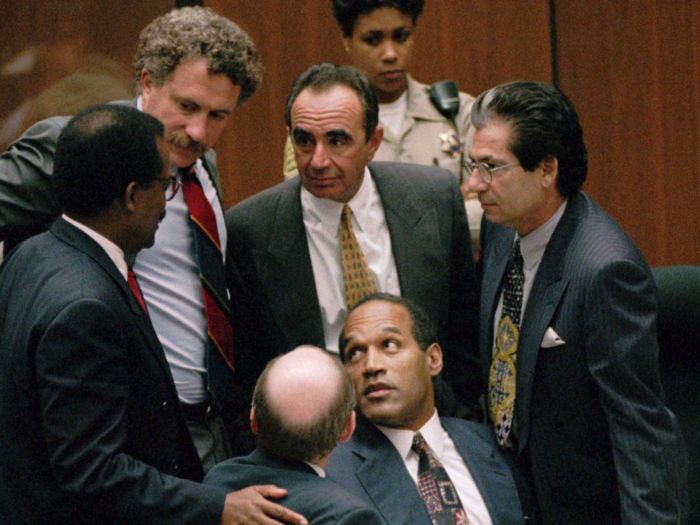
Robert Shapiro (behind Simpson), Simpson's lead defense attorney, petitioned Mills and Judge Lance Ito to dismiss the grand jury. He argued that pre-trial publicity had "contaminated" the grand jury and made it "virtually impossible for O.J. Simpson to receive either a fair trial or a fair grand jury review," reports The Philadelphia Inquirer.
LAPD detective Mark Fuhrman repeatedly pleaded the 5th on the stand in January 1995 when asked about his alleged use of racial epithets.
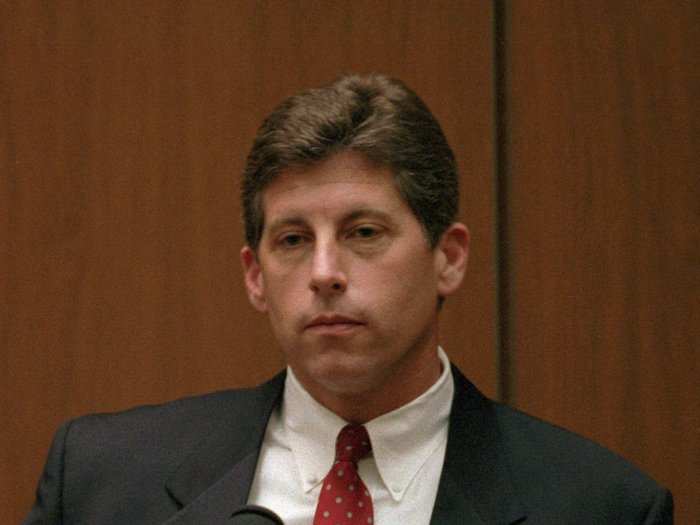
Simpson's defense team sought to portray the LAPD as incompetent throughout the trial.
LAPD detective Mark Fuhrman's credibility was called into question after tapes surfaced of him using racial epithets. The defense also claimed Fuhrman had planted blood on the glove that was a key piece of evidence, reports Time.
Denise Brown, Nicole Brown Simpson's younger sister, provided emotional testimony for the prosecution in February 1995. Brown characterized her former brother-in-law, O.J., as an abusive husband.
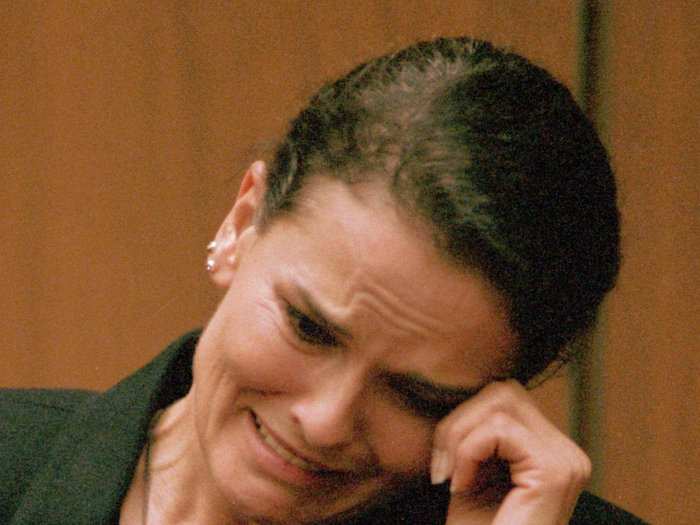
A teary-eyed Brown also told the courtroom on February 3, 1995 that Simpson had called his ex-wife a "fat pig," while she was pregnant, and threw her against a wall, reports the Los Angeles Times.
On February 12, 1995, jurors toured Nicole Brown Simpson's house (where she and Goldman were killed), Mezzaluna restaurant (where Goldman worked and Nicole Brown Simpson reportedly dined on the night she died), and Simpson's house.
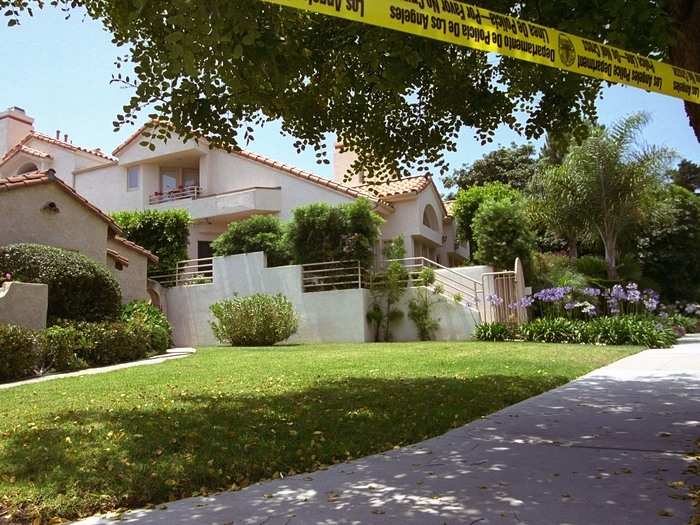
Nicole Brown's house, pictured above, was bought and renovated a few months after the murders, according to the Los Angeles Times.
Mezzaluna, a once-popular restaurant in the upscale Brentwood neighborhood of Los Angeles, closed in 1997 amid the publicity of Simpson's trial. Everything in the restaurant was auctioned off as memorabilia, reports the Los Angeles Times.
Brian "Kato" Kaelin's testimony in March 1995 made him a minor celebrity during the trial. His southern California-surfer style and inadvertently hilarious responses to prosecutor Marcia Clark drew laughs from the courtroom.
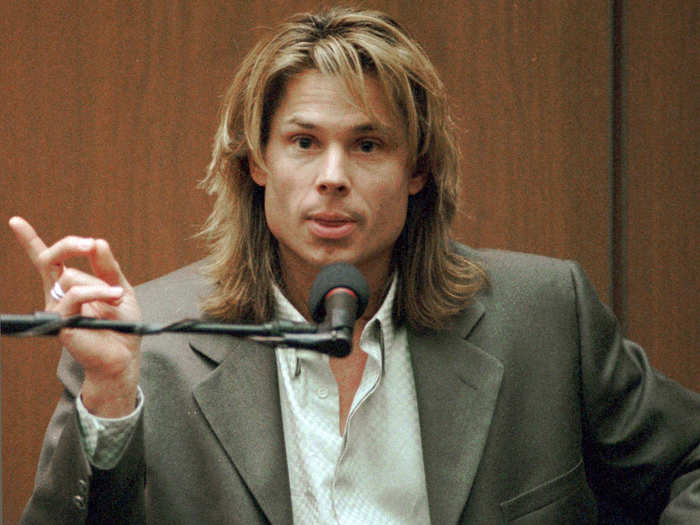
When asked by prosecutor Marcia Clark if being Simpson's housemate had helped his acting career, Kaelin responded sarcastically, "I don't think we were going for the same parts."
Watch Kaelin's testimony here (the line is at 6:08).
Judge Lance Ito also became a minor celebrity during the trial and was made even more famous by the "Dancing Itos" on the "Tonight Show with Jay Leno" in April 1995.
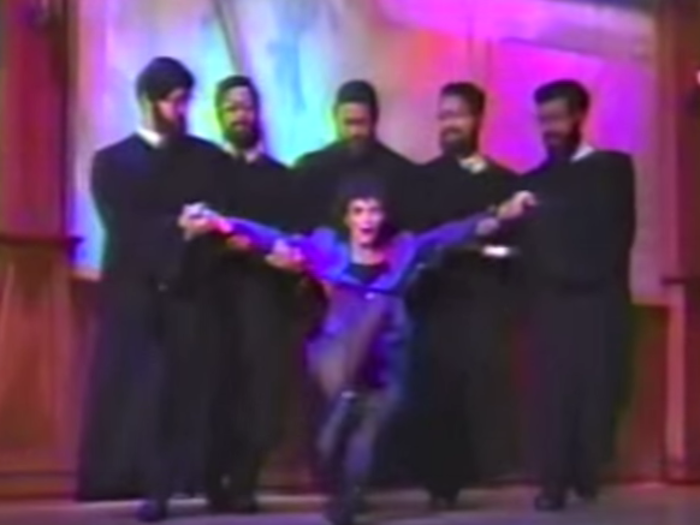
Ito was celebrated by lawyers involved in the trial for "keeping an extraordinary case from disintegrating into chaos or degenerating into farce," reports The New York Times.
But Ito became the subject of a farce anyway. In a marvelous display of 1990s campiness, Jay Leno brought a troupe of "Dancing Ito's" clad in judicial robes to living rooms across the US.
See the "Dancing Itos" here.
Dr. Lakshmanan Sathyavagiswaran, the LA county coroner, demonstrates on prosecutor Brian Kelberg how Ronald Goldman's throat may have been slashed during Simpson's trial on June 9, 1995.
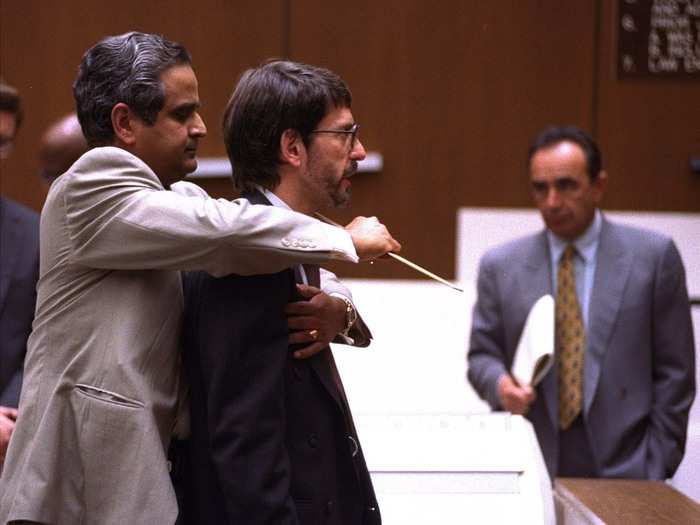
One of the key pieces of the prosecution's case was a bloody leather glove, allegedly found by LAPD detective Mark Fuhrman on Simpson's property. The prosecution thought that Simpson had used the gloves to disguise himself before murdering Goldman and Nicole Brown Simpson. Simpson tries on the glove on June 15, 1995.
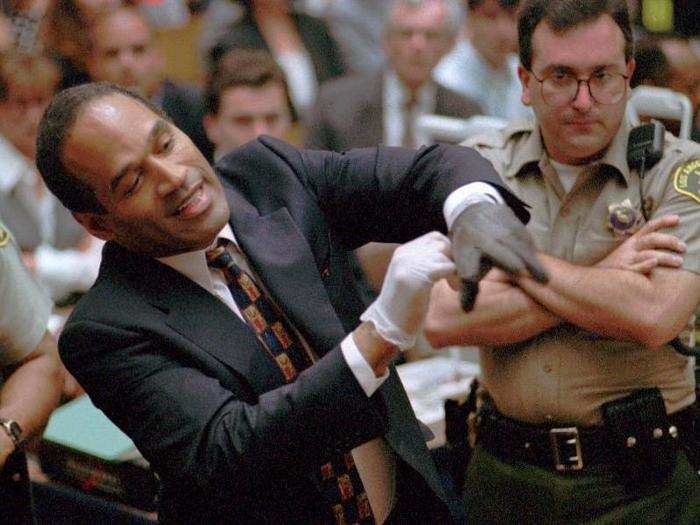
The prosecution asked Simpson to try on the glove in front of the courtroom. After struggling to fit the glove over his hands, Simpson walked over to the jury box and simply told the jurors that, "it doesn't fit," according to NBC.
It wasn't a good moment for the prosecution.
Johnnie Cochran, one of O.J.'s "dream team" of defense attorneys, coined the famous phrase, "if it doesn't fit, you must acquit." He's seen here using it during the defense's closing arguments on September 27, 1995.
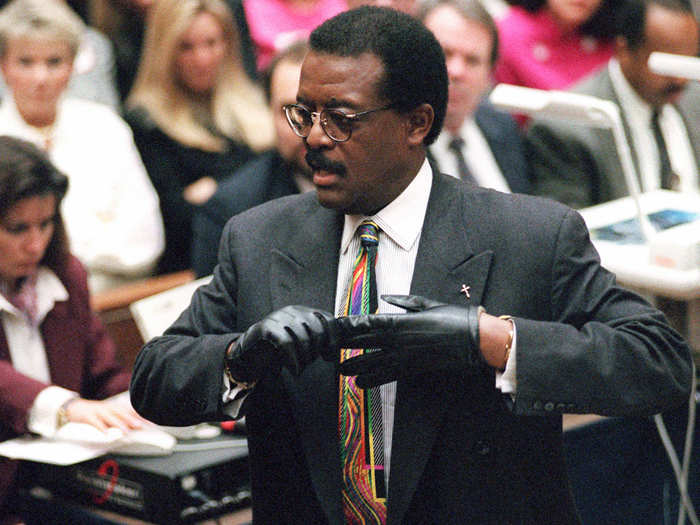
The bloody glove — and the fact that it did not fit on Simpson's hand — proved critical for the defense team.
The defense team repeatedly alluded to the glove throughout the trial, and Cochran often brought replicas into the courtroom to remind the jury that if the evidence doesn't fit the prosecution's theory, like the glove on Simpson's hand, then the jury must acquit Simpson.
Here's a video of Cochran using the phrase during Simpson's trial.
On October 3, 1995 the judge reads the not guilty verdict. Simpson and his lawyers cheer.
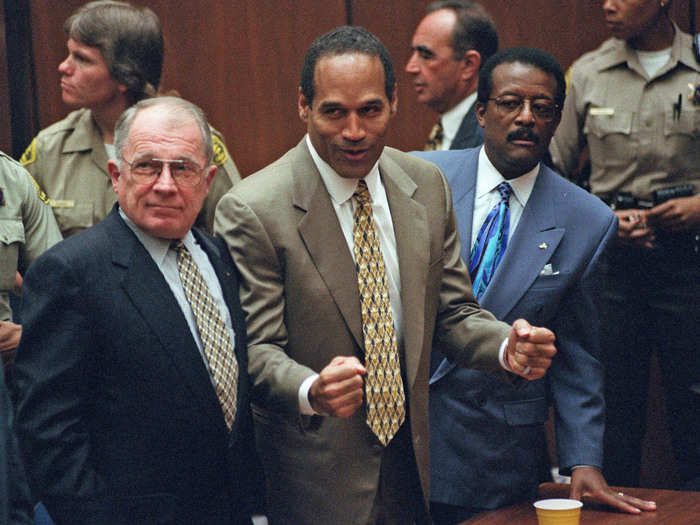
When the verdict was being read, it seemed as if the whole world stopped. Time estimates that over 150 million viewers — 57% of the country — tuned in to see the jury's decision.
And according to Alan Dershowitz's book, "America on Trial," trading volume on the New York Stock Exchange dropped by 41%, government meetings were delayed, and electricity consumption surged as Americans huddled around their televisions. President Bill Clinton even took a "brief break" from his work in the Oval Office to hear the verdict.
School days around the country were also interrupted. Business Insider senior editor Erin Fuchs remembers a television being dragged into her school lunch room so the students wouldn't miss out.
Watch it here.
Popular Right Now
Popular Keywords
Advertisement